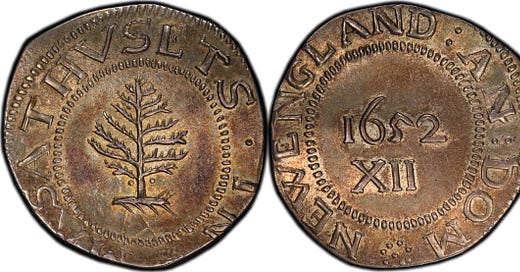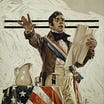America began with the enterprises of two chartered corporations. It should hardly surprise us, given our financial power and complexity. One of these corporations, the Virginia Company, was founded to turn a profit as all colonial chartered companies were, and the decisions the Company’s London shareholders made reflect this. But the second, the Massachusetts Bay Company, was different. When Charles I granted them a royal charter he assumed they would meet in London, as the other companies did.
But this organization was a Puritan project, and the highly literate Calvinists had the loophole they’d been looking for. Unlike the Virginia Company, New Netherlands, or similar projects, the shareholders, led by John Winthrop, left for Boston and took their charter with them.1 Far from Royal oversight, they undertook what had always been their aim-using the frame of a company charter to build their dream of a Puritan Commonwealth.
I’ve previously cited Nick Land’s assertion that the core of Protestantism is Schism, 2 and what the Massachusetts Bay Company became is one of the most incredible and successful examples of this practice. Instead of continued toil within the British project, the Puritans left to form New Jerusalem, and in so doing founded their own great maritime republic. There are good lessons in their history for those willing to learn them.
The pillars of their success are twofold, and both deserve serious attention because both remain things that spell success for those who practice them. Firstly we have the family, a sacred K Line that outlasted even their stern theology. The great Puritan writer William Tyndale wrote that “Family is the root whence church and commonwealth spring.”3 This view would be one adopted by Americans from Samuel Adams to Woodrow Wilson, spanning centuries. The former of these, already 150 years removed from Winthrop’s landing on Boston’s shores, dreamed of a free and independent New England that was in his words, ‘Christian Sparta’.4 Harriett Beecher Stowe would echo this, saying
“among the peculiarly English ideas which the Colonists brought to Massachusetts, which all the wear and tear of democracy have not been able to obliterate, was that of family. Family feeling, family pride, family hope and fear and desire, were, in my early day, strongly-marked traits. Genealogy was a thing at the tip of every person’s tongue, and in every person’s mind. … “Of a very respectable family,” was a sentence so often repeated at the old fireside that its influence went in part to make up my character.”5
Woodrow Wilson would similarly write “I become more and more conscious of the hereditary wealth I possess, the capital of principle, of literary force and skill, of capacity for first-hand thought; and I feel more and more bent toward creating my own children that combined respect and tender devotion for their father that you gave your children for you.”6 What Wilson here describes is precisely the target of the concept of white privilege, the gift that Americans have been passing down to each other since the first colonists set foot here. The American ideal of the family was one they directly inherited from the Puritans, and the extent to which that is no longer true correlates directly with the extent to which America is no longer American.
The second piece of this equation is their unparalleled sense for finance and economy. As Donald Frey points out, contrary to the assertions of some, “The Puritans did not glorify “capitalist enterprise”—two words which they would not have approved or even understood. They condemned the pursuit of wealth for its own sake”.7 Frey’s study is specific to the now forgotten but critical American Economist Daniel Raymond, credited along with Hamilton as one of America’s first native economic thinkers, and join architect of the American System. “Early in his text Raymond asked whether capital is a “cause of wealth” and answered in the negative. Labor is a cause of wealth, and land is a “source” of wealth. Capital, however, is neither. It is merely “an instrument in the hands of man”8 This is a very critical position he takes and one that has its foundations in the Puritan’s supreme act of independence and defiance against the British Crown-the Pine Tree Shilling.
The Pine Tree Shilling was clipped, which is to say it was not the normal weight of a Shilling, and as such would not be generally accepted outside the colony. But this was not Boston’s aim, rather, they wanted a currency decoupled from their very limited supply of hard commodities to enable trade and commerce. What they were pioneering was a faith-based currency, one whose trust laid not primarily in its exact weight in sought-after metals but rather in the community’s unity and reliability. In the words of Christopher Sandbatch, “Its pretty much responsible for turning Boston into a successful colony”. What Boston had done with a small minting operation was both succeed and declare de facto independence in a way that could not be realized for over 100 years, yet vouchsafed the birth of a fourth great maritime republic.
Frey again writes of Raymond’s economics “Puritan individualism was a relational individualism, requiring individuals to understand themselves to be members of a community and to serve the common good, not just self. To reduce individualism to pure self-interest was sin…In contrast to the writings of early economists, Raymond’s manifest the Puritan understanding of self-interest.”9 Raymond, recalling the trailblazing of Massachusetts Bay, had found a way to weaponize the Puritans' (and subsequently, the Americans') virtue and quality against the rest of the world, and even the mighty British Empire could not stop them.
The implication for us should be obvious. The Puritans cracked the code-using the latest innovation (in their case, the corporation) to make their own free and independent Commonwealth, which would flourish into the mighty United States. I gladly count myself among the 35 Million descendants of the surviving passengers of the Mayflower and know that so long as these pillars are around, we will be too.
Peterson, Mark. The City State of Boston: The Rise and Fall of an Atlantic Power, 1630-1865. Princeton, NJ: Princeton University Press, 2019.
Bacon, Francis. "Of Unity in Religion." Essays, Civil and Moral. Harvard Classics, edited by Charles W. Eliot, vol. 3, P.F. Collier & Son, 1909, p. 49.
Letter to Elbridge Gerry on January 23, 1780, The Writings of Samuel Adams, vol. 4, p. 224.
Stowe, Harriet Beecher. "The History of Lady Byron's Life." The Atlantic Monthly, vol. 29, no. 174, 1872, pp. 22-23.
Wilson, Woodrow. The Papers of Woodrow Wilson. Vol. 6. Ed. Arthur S. Link. Princeton University Press, 1971, pp. 30-31.
Frey, Donald E. The Puritan Roots of Daniel Raymond's Economics. Journal of the History of Economic Thought 26, no. 2 (2004): 225-238.
Raymond, Daniel. The Elements of Political Economy. Vol. 1. Boston: Wells and Lilly, 1823. p. 101
Ibid







I think about the “Christian Sparta” often. But yeah some good source material and lessons/thoughts to be pulled from this. I had forgotten about the Pine Tree Shilling as well.
"What they were pioneering was a faith-based currency, one whose trust laid not primarily in its exact weight in sought-after metals but rather in the community’s unity and reliability. In the words of Christopher Sandbatch, “Its pretty much responsible for turning Boston into a successful colony”. What Boston had done with a small minting operation was both succeed and declare de facto independence in a way that could not be realized for over 100 years, yet vouchsafed the birth of a fourth great maritime republic."
This is really interesting. I'm not much of a crypto fanatic but the parallels do stand out.